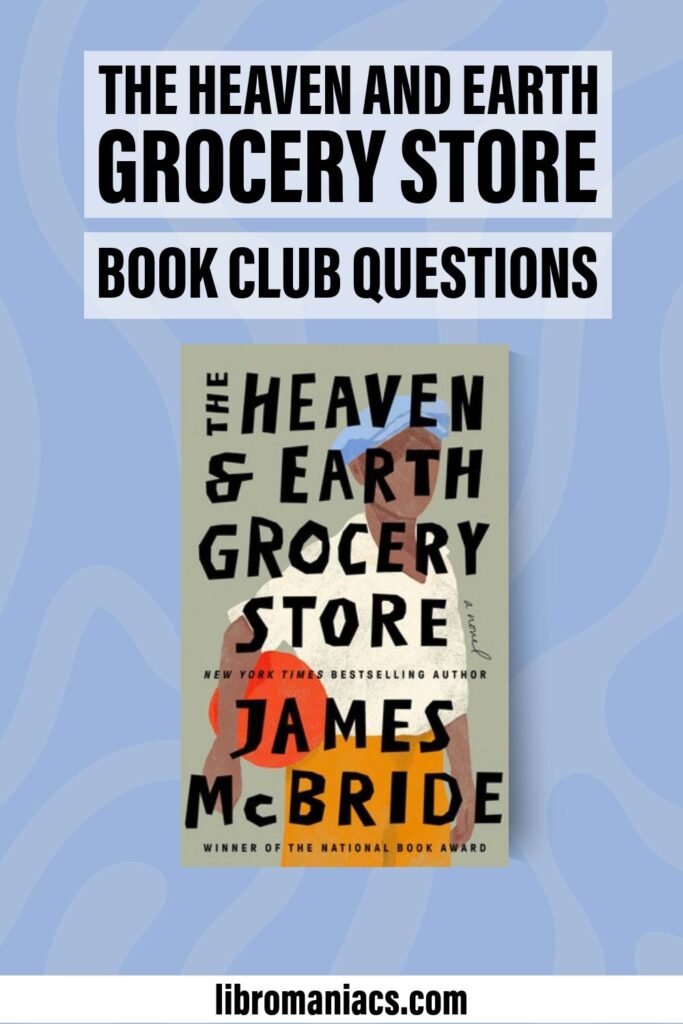The Heaven and Earth Grocery Store is no easy, peasy breezy book club read. There’s a lot going on in Chicken Hill! McBride has brought together his vivid prose and a huge cast of characters to explore culture and community in 1930’s Pottstown, PA.
The residents of Chicken Hill have to battle day to day racism, poor city services, and poverty. But these African American and Jewish residents have a more coherent community than the whites who have isolated themselves down in town. The book looks at themes like what it means to be an other, how love can build community, the value of long-standing loyalty, and how, when many people take even small actions, a strong web of resistance can be built.
Discuss those themes and this amazing book using our book club questions for The Heaven & Earth Grocery Store. This guide will help your book group get started with 10 discussion prompts. But this Heaven and Earth Grocery Store discussion guide will also help you stimulate conversation with a book synopsis (does it reflect your experience of the book?) and some selected reviews (do you agree or disagree with the reviewers?).
And if you loved it, we’ve also got several suggestions for what to read next.
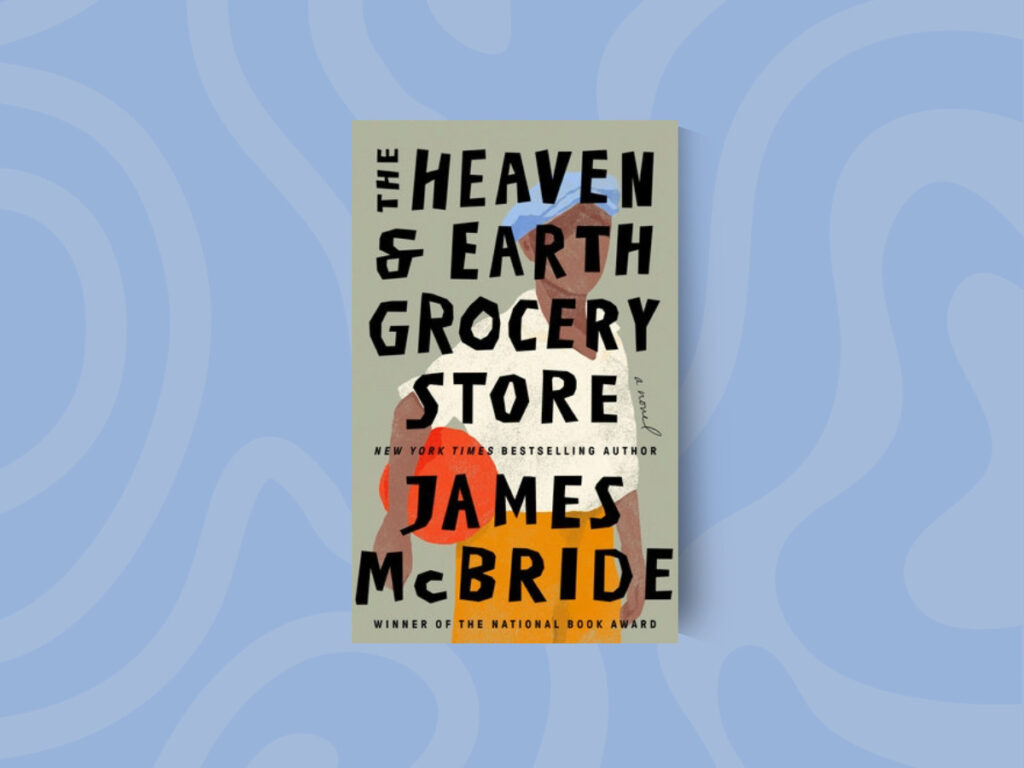
The Heaven and Earth Grocery Store Synopsis
(We always chose to provide the publisher synopsis because we feel that it’s worthwhile to discuss whether the official book description actually squared with your experience of the book.)
The Heaven and Earth Grocery Store, James McBride
In 1972, when workers in Pottstown, Pennsylvania, were digging the foundations for a new development, the last thing they expected to find was a skeleton at the bottom of a well. Who the skeleton was and how it got there were two of the long-held secrets kept by the residents of Chicken Hill, the dilapidated neighborhood where immigrant Jews and African Americans lived side by side and shared ambitions and sorrows. Chicken Hill was where Moshe and Chona Ludlow lived when Moshe integrated his theater and where Chona ran the Heaven & Earth Grocery Store. When the state came looking for a deaf boy to institutionalize him, it was Chona and Nate Timblin, the Black janitor at Moshe’s theater and the unofficial leader of the Black community on Chicken Hill, who worked together to keep the boy safe.
As these characters’ stories overlap and deepen, it becomes clear how much the people who live on the margins of white, Christian America struggle and what they must do to survive. When the truth is finally revealed about what happened on Chicken Hill and the part the town’s white establishment played in it, McBride shows us that even in dark times, it is love and community—heaven and earth—that sustain us.
10 The Heaven and Earth Grocery Store Book Club Questions
These questions have been tailored to this book’s specific reading experience, but if you want more ideas, we also have an article with 101 generic book club questions.
- “…Chicken Hill, a tiny area of ramshackle houses and dirt roads where the town’s blacks, Jews and immigrant whites who couldn’t afford any better lived…”
Chicken Hill was a racial, cultural and religious melting pot. The whites were the segregated ones (albeit with much better city services). Are there lessons about Chicken Hill’s melting pot that we can apply to our present day culture wars? - “Chona had never been one to play by the rules of American society. She did not experience the world as most people did. To her, the world was not a china closet where you admire this and don’t touch that. Rather, she saw it as a place where every act of living was a chance for tikkun olam, to improve the world.”
Chona is undeniably the heart of this story. Discuss some of the ways that she held the community together. How did her actions affect the Chicken Hill residents, even after her death? - If the book had never specified a setting, would you have assumed that it was set in the Deep South? Were you surprised by the level of racism, KKK activity, religious intolerance and abject poverty in 1930’s Pottstown?
- Nate is a mysterious and complicated character. Discuss some of the ways that he presents a contradiction.
- McBride devotes a whole chapter to Doc’s upbringing, which chronicles his journey from regular guy to bigot. Was Doc simply a creature of his circumstances? Did he have an evil heart?
- Poor Dodo! How much of his incarceration and treatment at the Penhurst State Hospital for the Insane and Feeble-Minded was driven by the (misguided) medical mores of the day vs racism vs evil intent?
- “…finger, that one solitary white finger, reaching out in friendship and solidarity, shone in his memory like a bright, shining star.”
The relationship between Dodo and Monkey Pants is both inspirational and heartbreaking. How did you respond to the unlikely friendship and each of their fates? - Malachi flits in and out of the action, but he also anchors it in a very specific way. What’s his significance to the story?
- Because of the large cast of characters, some got left by the wayside as the plot moved forward. For instance, once Chona dies, Moshe’s role is much diminished. Was this necessary to getting the plot concluded? Are there some characters for whom you would have wanted more closure?
- The book is stuffed with many characters, and the chapters shift between their perspectives. You get some individual character’s back story, but never their whole story. Were you able to follow along? Were there some relationships between the characters that you found compelling? Some that you found confusing?
Selected Reviews for The Heaven and Earth Grocery Store
“This tale made me want to be better, to do better, to open my eyes to all the missed connections, to fix the broken chords and forge new ones, and seek eternally to strengthen them. We are humanity, we are the essential substance to add love to the world, one modest good deed at a time. That is The Heaven and Earth Grocery Store.”
“This is going to be another of those reviews where I open by saying I’m having a hard time articulating exactly what didn’t work for me because on the surface it seems like this should be a tour de force. All the “classic novel” ingredients are here. But, having thought about it a bit I think that’s the problem. The ingredients are here but nobody put them together very well […] I feel like this book had absolutely no editor or guiding hand of any kind saying ‘James I love what you’re doing but you don’t need forty supporting characters and they don’t all need their own fifteen page origin stories.'”
“Moving back in time to the 1930’s, I found a beautiful story of connections, of community, of caring, of respect, of friendship. But it’s also far from a perfect world in Pottstown , PA where as in life there are physical disabilities, corruption, racism, down right evil . Yet, it doesn’t feel heavy handed in its messaging . It’s even pretty humorous at times, while packing a punch at our society.”
“This one had so many digressions that the detours had detours.”
More Books Like The Heaven and Earth Grocery Store
We’ve listing three suggestions below, but if you’re hungry for more, we also have a whole article with yet more books similar to The Heaven & Earth Grocery Store.
If you want to read more books with primarily African American characters try: The Revisioners, Girl, Woman, Other, Such a Fun Age, or Hang the Moon.
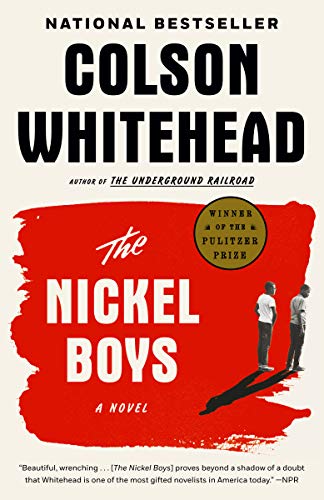
The Nickel Boys, Colson Whitehead
The Nickel Boys cues on themes of unfair incarceration and mistreatment a la the storyline between Dodo and Monkey Pants.
After Elwood makes an innocent mistake, his hopes of attending college are completely derailed and he’s sentenced to the Nickel Academy, which is less an academy and more a juvenile prison. The environment is corrupt and vicious, and the “students” need Hunger Games level skills to survive.
Elwood meets the scheming Turner, and together they make an unlikely pair, doing what they must to survive.
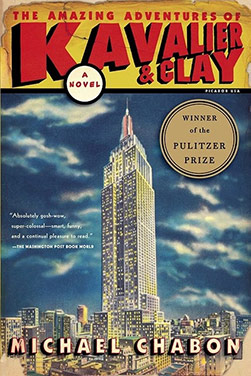
The Amazing Adventures of Kavalier & Clay, Michael Chabon
Chabon often features Jewish characters at the center of his stories, so if you want more of that (and may some more Yiddish), check out his backlist.
In Kavalier & Clay, we have the pleasure of meeting two Jewish cousins. Kavalier is a Jewish artist who escaped Nazi-occupied Prague and landed in NYC, where he meets up with his ambitious cousin Clay. Together they create an epic comic series (think original Marvel) that pushes the whole art form into a new direction.
You get their full story arc, along with some very complicated romantic dynamics, and family tragedies. With themes like the price you pay for chasing the American dream and the friction between art and business.
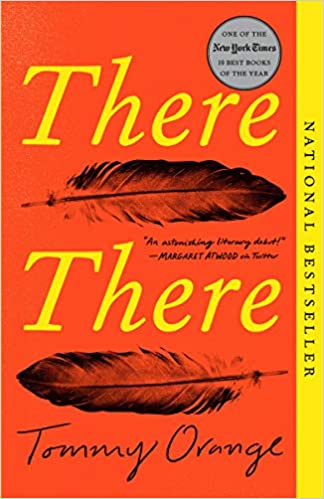
There There, Tommy Orange
This book doesn’t feature a small town, nor a melting pot of African Americans and Jews. But, like Heaven and Earth Grocery Store, it does feature a very large cast of characters presenting their individual points of view.
There There provides perspectives of modern Native American life, providing historical context and realities to their story. The story converges around 12 people who are all traveling to the same Oakland, California Pow Wow. They each bring their own experience of urban life and what it means to be a Native American in current times, each with their own unique journey, experiences and tough decisions to make about how to live their lives.
Share these The Heaven and Earth Grocery Store book club questions with your friends:
